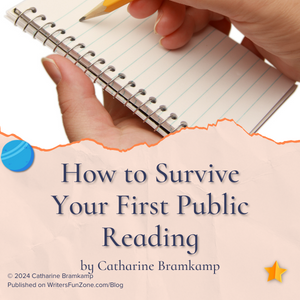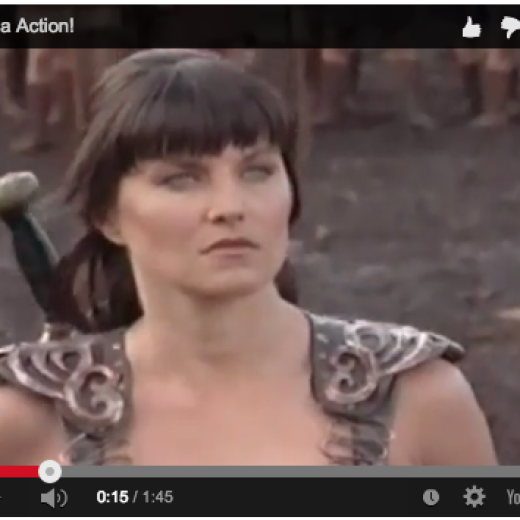How to Survive Your First Public Reading by Catharine Bramkamp
 Let’s welcome back monthly columnist Catharine Bramkamp as she shares with us “How to Survive Your First Public Reading.” Enjoy!
Let’s welcome back monthly columnist Catharine Bramkamp as she shares with us “How to Survive Your First Public Reading.” Enjoy!
***
You are likely brilliant and competent in your career, family, and social life.
But there are times when we face the prospect of being a complete beginner.
The first watercolor class, the first taiko drum attempt, the first time in a long time you experience not knowing.
It’s called Beginner’s Mind, or just being, once again, a beginner.
It’s good for us.
Really.
I facilitate a small bi-weekly writing workshop.
Yesterday was the first day we shared our work with the group.
For some, the prospect was nerve wracking, for others – terrifying. Sleep-loss terrifying.
Reading what began as a private work out loud to almost strangers is very scary. It’s also bold and courageous.
You need faith and confidence in your work to read out loud, when you’re finished you’ll need even more patience and self-esteem to politely suffer through helpful advice.
Here are the required roles for a first time reading.
The Artist
For your first reading, choose work that isn’t excruciatingly personal.
If you are considering two essays, and one is about abuse and the other is about the dog, choose the dog.
Share that this is your very first reading and you are nervous.
I know, in our professional worlds, showing vulnerability is such a risk no one ever, ever does it.
But in the creative world, the audience members understand nerves and fear and you are already applauded by being authentically connected.
Just say – wow, first time for me and I’m really nervous. Know that every member in that audience has a story about their own first reading experience – it’s burned in their brain.
They will not only be sympathetic, they are 100% supportive.
It’s okay to not look up. Keep your eyes on your devise or paper.
If your hands are shaking use a notebook to help steady the paper.
If there is a podium, use it, and hold onto the edges to steady yourself, forget the Toastmaster rules, stay steady on your feet.
Today you are jumping feet first into a very deep pool, use as many personal floatation devices as you need.
After you finish, some enthusiastic audience members may assault you with suggestions and ideas.
They are not insulting the work and they are not criticizing your efforts, far from it.
They are only excited about your work and see great potential. Their ideas are an expression of praise and generosity.
Nod, smile and breath. Thank your listeners for their support and bask in the triumph of getting through your first reading without vomiting.
The Facilitator
Shut up.
Facilitators, workshop leaders, teachers, professors, coaches love to help, that’s why we are here.
For this reading – don’t.
For this beginner, the whole point was reading the work.
Your job as a facilitator was to hold space for her to get it all out.
This is the triumph, and the only thing that needs to be celebrated.
Make a note of the reader’s emotional state and her nerves and save those impressions so when she reads for the second time, you can tell her how much she’s improved!
The Audience
The audience holds space for the reader.
We smile if he or she manages to look up from her trembling paper. We stay quiet.
When she finishes, we are profusely enthusiastic at the end, congratulating her on the performance and for sharing her words.
(If this sounds like all the rules for parents must follow. while attending their five-year-old’s first ballet performance, you are correct.)
If the audience is invited to comment (not necessarily a good thing) begin with compliments, in fact, that’s the exclusive category for this reading.
Be specific: I liked the phrase XXX. The line XXX gave me chills. You really captured XXX. And that’s all.
Oh, then Shut Up.
First readings are not the moment to help refine and make suggestions about the work even if it’s a compliment (wow, you’ve started a wonderful Imagist Poem, if you expand on this phrase and add these words you will have a poem to submit).
Even I shut up. Another beginner’s first.
Of course, the common wisdom and suggestions to first time readers is to just do it.
Sure. You may lose sleep, you may be terribly nervous.
But if you wait to eat lunch or dinner until after your reading, and have faith in the generosity of your audience, you will get through it.
Good luck!
You will be amazing.
***
Want to read more articles like this one Writer’s Fun Zone? Subscribe here.
***
ABOUT THE AUTHOR
 Catharine Bramkamp is a successful writing coach, Chief Storytelling Officer, former co-producer of Newbie Writers Podcast, and author of a dozen books including the Real Estate Diva Mysteries series, and The Future Girls series. She holds two degrees in English and is an adjunct university professor. After fracturing her wrist, she has figured out there is very little she is able to do with one hand tied behind her back. She delights in inspiring her readers.
Catharine Bramkamp is a successful writing coach, Chief Storytelling Officer, former co-producer of Newbie Writers Podcast, and author of a dozen books including the Real Estate Diva Mysteries series, and The Future Girls series. She holds two degrees in English and is an adjunct university professor. After fracturing her wrist, she has figured out there is very little she is able to do with one hand tied behind her back. She delights in inspiring her readers.






